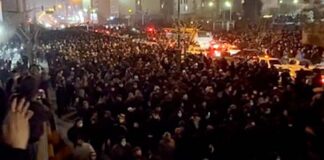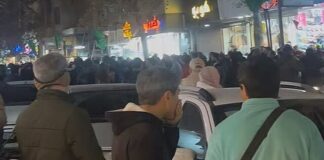Despite heavy state repression Iran’s democracy movement remains defiant. Following President Ahmadinejad’s confirmation ceremony in early August thousands took to the streets again and clashed with security forces.
The split in Iran’s ruling class has widened too. Only 13 of 70 reformist MPs attended the ceremony, in an unprecedented break with protocol. Those absent included two former presidents.
The regime’s show trials of protesters were denounced by former reformist president Khatami on his website, while Mousavi, this year’s reformist candidate, rejected confessions as extracted under torture.
The siding of Ayatollah Hashemi Rafsanjani with the opposition helps explain the divisions and their seriousness.
Rafsanjani, a former president, is one of the richest men in Iran and a supporter of increasing the role of private capitalism.
Concern at the state of the economy is key to divisions amongst the elite. Official inflation is running at 25 per cent, unemployment between 20 and 30 per cent, and even many of those in work are on poverty wages.
Reformists like Mousavi are also worried that rampant corruption is eroding the regime’s legitimacy. With much of the economy still state-run, control of government ministries gives access to lucrative posts—and the opportunity to gain personal benefit in the process of privatisations. The state’s military wings such as the Revolutionary Guards also control a range of businesses. Under Ahmadinejad their access to lucrative contracts increased.
Some in the elite have lost out under Ahmadinehad, including Rafsanjani. Along with reformists like Mousavi he favours opening up the economy to more foreign investment and private ownership to make state industries more “efficient”.
The economic problems have led to deep discontent among Iran’s workers. There have been outbreaks of strikes, although heavy repression makes union organising difficult. The huge outpouring of opposition to the regime seen in the protests since the election shows the scale of bitterness at the base of Iranian society.
There is a deep desire for widespread change, also shown by fact that enthusiasm for Mousavi began only when he began talking of easing social restrictions on women and appearing alongside his wife, a prominent academic.
But whether the movement can succeed in winning democracy and improved living standards depends on ordinary Iranians taking the direction of the protest movement into their own hands.
Iranian workers will gain nothing from a neo-liberal reordering of the economy. Political organisation independent of figures like Mousavi and Rafsanjani will need to emerge if the interests of ordinary people are to win out.
By James Supple





